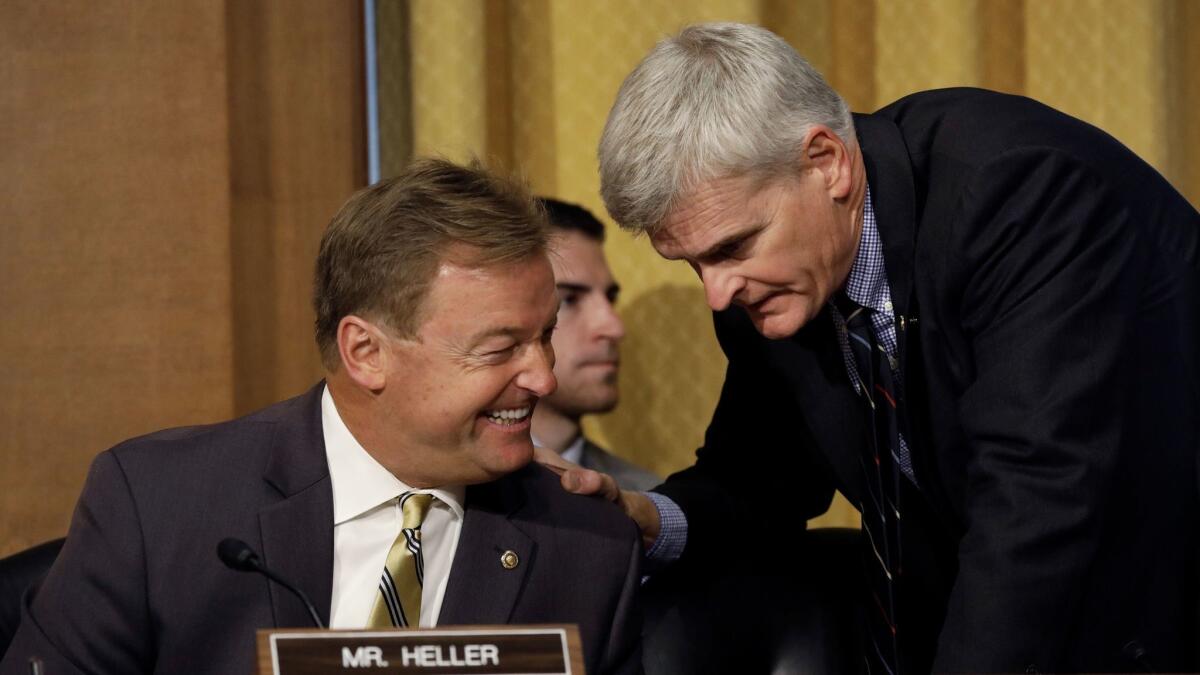Column: As dismay with GOP’s Obamacare repeal rises, the question becomes: Why are they doing this?

The reviews keep pouring in for the Senate Republicans’ latest (and presumably final) attempt to repeal the Affordable Care Act, and they’re uniformly foul.
The newest entries came from the National Assn. of Medicaid Directors and from Nevada’s Republican Gov. Brian Sandoval. The Medicaid directors observed that the measure would force states to completely remake their Medicaid programs within two years, a task that the “vast majority” would find impossible. The repeal bill’s capping of federal Medicaid funds and conversion of Medicaid and individual market subsidies to block grants “would constitute the largest intergovernmental transfer of financial risk from the federal government to the states in our country’s history.”
Few states, if any, are prepared for the change. The healthcare consulting firm Avalere, in a new study, placed the loss in all Medicaid funding to states at $896 billion through 2026, and $3.6 trillion through 2036. Every state would lose money compared with current law, Avalere said, with states represented by some of the repeal bill’s sponsors among the worst hit.
Republicans campaigned on this so often that you have a responsibility to carry out what you said in the campaign.
— Sen. Charles Grassley, R-Iowa
Sandoval, working from a state analysis that showed Nevada losing as much as $2 billion in federal funding in 2026 alone if the repeal bill becomes law, dismissed its sponsors’ claim that the measure gives states more “flexibility” to run their healthcare sectors. “Flexibility with reduced funding is a false choice,” Sandoval said. “I will not pit seniors, children, families, the mentally ill, the critically ill, hospitals, care providers, or any other Nevadan against each other because of cuts to Nevada’s health-care delivery system.”
Sandoval’s statement was a direct slap at one of the repeal measure’s chief sponsors, Sen. Dean Heller, R-Nev.
These critics took their place with virtually every professional organization in the healthcare field; advocates for patients, the disabled and children; a bipartisan group of governors; and healthcare number-crunchers of every description.
These reactions point to what may be the most important question raised by the repeal effort: Why are the Republicans doing this?
The responses offered by individual senators have been muddled. Many point to the virtues of transferring control over healthcare to the states, but don’t acknowledge the harsh reductions in funding that will hamstring any effort to do so.
“The binary choice is: 100% guarantee that Obamacare remains in place, and we may have a path to single-payer, versus this choice of federalism, where we start putting the states back in charge,” Sen. Ron Johnson, R-Wisc., one of the bill’s four principal sponsors, told reporters this week.
Perhaps the most straightforward answer came from Sen. Chuck Grassley, R-Iowa, who told Iowa reporters in a Wednesday conference call that the bill aimed to fulfill a GOP campaign promise to repeal the Affordable Care Act, no matter how.
“You know, I could maybe give you 10 reasons why this bill shouldn’t be considered,” Grassley said, according to the Des Moines Register. “But Republicans campaigned on this so often that you have a responsibility to carry out what you said in the campaign. That’s pretty much as much of a reason as the substance of the bill.”
But the real reason may have more to do with the deep pockets of GOP donors. At a retreat sponsored by the Koch brothers in June, wealthy donors warned Republicans that their piggy bank might be closed unless the donors saw progress on a conservative agenda that encompassed healthcare repeal and tax cuts.
“There is urgency,” Tim Phillips, the head of Americans for Prosperity, the Koch network’s political arm, told the Guardian during the retreat. “We believe we have a window of about 12 months to get as much of it accomplished as possible before the 2018 elections grind policy to a halt.”
Heller also has faced overt pressure from Las Vegas casino magnate Steve Wynn, who is finance chair of the Republican National Committee, over his failure to support a previous repeal bill.
As for the timing of the vote, which is tentatively scheduled for next week, that’s dictated by the rules of reconciliation votes, which would enable the measure to pass with 50 votes plus a tie-breaker cast by Vice President Mike Pence. The timing is dictated by the rules of budget reconciliation, which would exempt the measure from a Democratic filibuster and enable it to pass with 50 votes instead of 60. The reconciliation window closes on Sept. 30.
Grassley told Iowa reporters that he thought the bill was unlikely to reach the 50-vote threshold. As of Friday, at least two of the 52 GOP senators, Rand Paul of Kentucky and Susan Collins of Maine, are thought to be firm “no” votes. Several more, including Lisa Murkowski of Alaska and John McCain of Arizona, have signaled doubts.
[UPDATE: McCain said Friday that he will not vote for the bill, likely a fatal blow to its chances for passage. Collins also said Friday she is leaning toward a no vote.]
The repeal bill has been dubbed Cassidy-Graham-Heller-Johnson after its chief sponsors, Sens. Bill Cassidy of Louisiana, Lindsey Graham of South Carolina, and Heller and Johnson. The measure would end the ACA’s Medicaid expansion funding and subsidies for premiums and cost-sharing with a block-grant of funding for states. The block grants, however, would represent a shortfall from both categories of funding under current law, and the formula for distribution would favor states that refused Medicaid expansion over those that accepted it. After 2026, however, the block grants would end, with no provision for replacing them, and by 2036 every state would experience a relative loss.
The measure also would eviscerate the Affordable Care Act’s consumer protections. These include protection for people with pre-existing medical conditions or histories, and requirements that every health plan cover 10 essential benefits, including maternity, mental health care, hospitalization and prescription drugs.
The bill would allow states to request waivers from these mandates--an invitation to states to allow insurers to market junk insurance to their residents. The states could also request waivers allowing insurers to charge those with pre-existing conditions more “as a condition of enrollment or continued enrollment… on the basis of any health status-related factor.” Translation: Under such a waiver, insurers could check applicants’ health or medical histories before setting premiums — even for renewals.
Without a substantive rationale for enactment, the argument that Republicans must fulfill their campaign pledge to repeal the Affordable Care Act may not be enough of a spur to secure the last few needed votes. It may become harder as more concrete evidence arrives of the damage the bill could wreak on state budgets coast-to-coast.
The Medicaid directors association observed that federal funding for the program comes to about 25% of the average state budget. Under the repeal bill’s block-grant formula, according to Avalere, the biggest loser would be California, which would face a cut compared with current law of $181 billion, or 34%, through 2026 and $784 billion, or 44%, through 2036.
The largest percentage cuts would be suffered by Heller’s home state of Nevada. Avalere calculates that the state would lose 44% of its expected federal funding, or $10 billion, through 2026, and a staggering 56%, or $41 billion, through 2036. Among senators on the fence, McCain’s home state of Arizona would lose 37% of its projected funding through 2036 and Murkowski’s home state of Alaska would lose 31%. The repeal bill’s sponsors reportedly have been trying to amend the bill to cushion the losses for Alaska in hopes of gaining her vote, however.
Keep up to date with Michael Hiltzik. Follow @hiltzikm on Twitter, see his Facebook page, or email [email protected].
Return to Michael Hiltzik’s blog.
UPDATES:
11:43 a.m.: This post has been updated with McCain’s statement that he will vote against the repeal bill, likely dooming its chances of passage.
More to Read
Sign up for Essential California
The most important California stories and recommendations in your inbox every morning.
You may occasionally receive promotional content from the Los Angeles Times.











